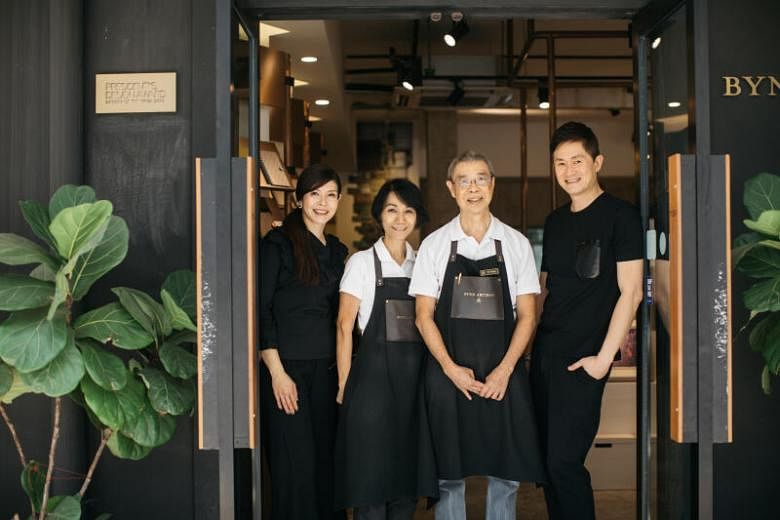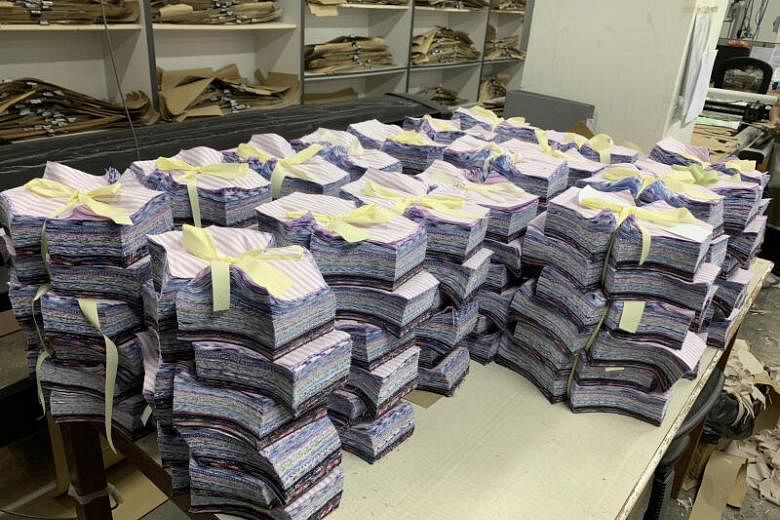SINGAPORE - Two months ago, home-grown bespoke tailor CYC Tailor was still producing sharply fitted men's shirts. Today, they are registered as an essential service churning out masks for the masses.
The shift began in early March, when the brand started researching and prototyping mask designs, says managing director Fong Loo Fern. Prior to the circuit breaker, business had dropped by about 80 per cent.
With dwindling orders and a team of 20 tailors and cutting staff, they "had to find something to do", adds Mrs Fong, who is in her 60s. "I was trying to crack my mind as to how we could (continue) so our staff would be kept busy and paid."
Fabric masks were a "natural extension of what CYC does", she says.
It was also an obvious solution given the rising demand. The label now offers Egyptian cotton masks, made from both excess and brand new shirting fabric.
The tailoring company is one of a handful of local retail businesses that have pivoted to making more 'relevant' products during Covid-19. The need for face masks and medical coveralls have fast replaced that for apparel and accessories, now deemed non-essential.
While meeting demand for such products, it also keeps staff employed and useful, say business-owners. For some, it is also an entry point for new customers to get acquainted with the label.
While sales from the CYC masks are nowhere near enough to make up for the dip in revenue, it is "at least a form of revenue to sustain us", says Mrs Fong.
CYC's facility located in Bendemeer Road was granted permission to continue operations. Since April, staff have been cutting fabrics to distribute as part of a larger initiative that taps on volunteers to sew 300,000 masks for migrant workers. CYC has a large cutting room suitable for mass-scale cutting, because of their B2B arm producing corporate uniforms.
"I wish we could go back to normal, to our normal business," adds Mrs Fong. "But we have to be flexible to adapt to the changing circumstances. If there's no other business to do, we have to continue to do this."
This Labour Day, ST speaks to three other businesses who have effectively redistributed labour in a time of crisis.
Outfitting Indonesian medical workers in coveralls
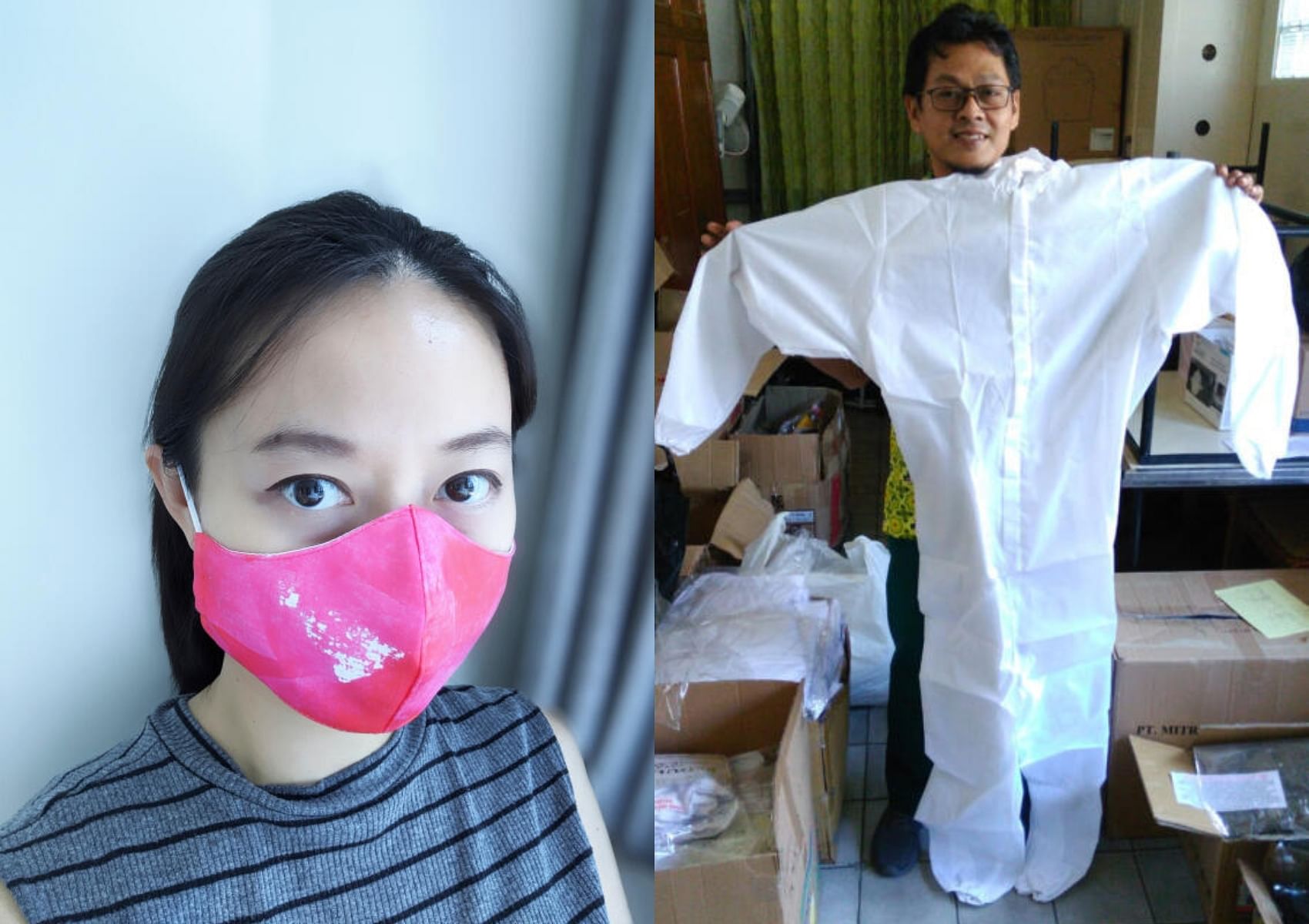
When she saw daily news reports of medical workers in her home country of Indonesia wearing raincoats to face patients with Covid-19, designer Anseina Eliza knew she had to do something.
The Singapore-based Indonesian designer is behind womenswear label Ans.Ein, which on a regular day produces whimsical pieces with custom prints. But sales had plummeted by around 80 per cent since the early weeks of the pandemic.
"People are not going anywhere, so they don't need fashion items now. We thought why not shift our resources to do something more important?" says Ms Anseina, 35.
She took to researching how to make medical coveralls, liaising with doctors in Indonesia to test prototypes. Medical-grade material was hard to come by, but the doctors told her the priority was to make the coveralls waterproof as Covid-19 is spread via droplets, she says.
She next galvanised her team of eight seamstresses in Jakarta to divert their dressmaking skills to coverall construction. Her business partner, who is based there, helped oversee production.
The washable coveralls come with details like concealed zippers and velcro to prevent droplets from entering gaps in the garment. "We even try to minimise the sewing, because stitches also have gaps," Ms Anseina adds. The garments are then sterilised with a UV machine on loan.
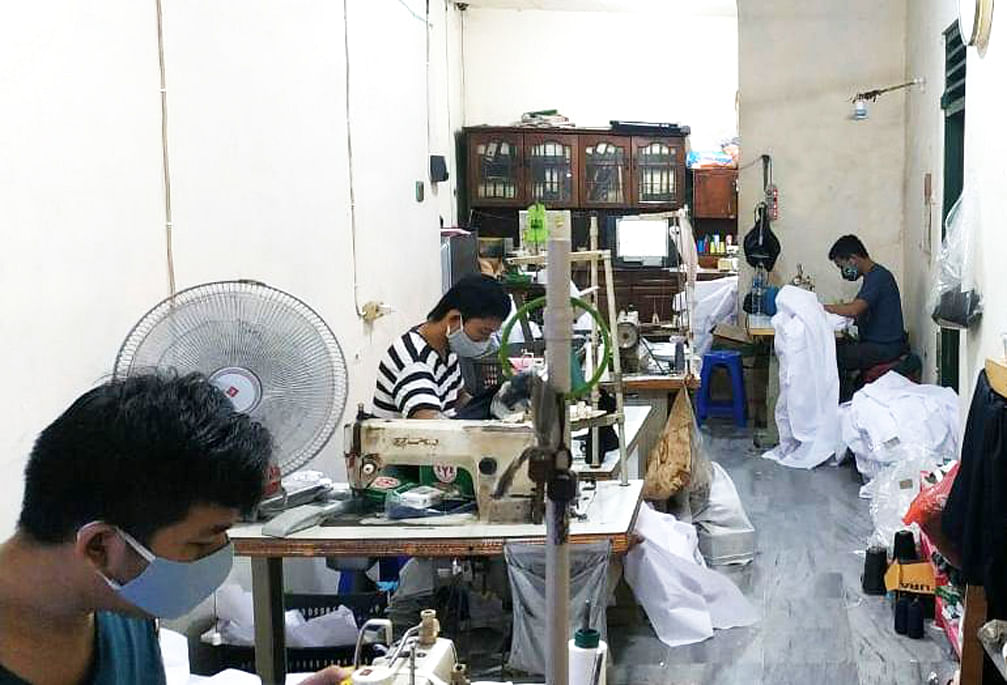
Within three weeks they completed the first batch. Since late March, they have distributed about 3,500 coveralls to hospitals and polyclinics in Indonesia, with a target of 8,800.
The exercise has eaten into her personal funds. Some larger hospitals which could afford to pay bought the coveralls. But more - smaller hospitals in remote areas even Ms Anseina had "never heard of before" - were gifted them for free. Priced at $10, each coverall just about covers the cost of material and paying the seamstress.
Despite this, Ms Anseina hired five more seamstresses. "They came to us and asked for a job, because businesses in Indonesia closed. Since we have something to do, we accepted them."
In early April, they started producing fabric masks too. Noting that essential workers in Singapore still had to go to work everyday, she pledged to donate 1,000 masks to essential service workers including cleaners and security guards. Ans.Ein has since donated 1,500 masks, with more, currently in production, on the way.
These were made from new, plain fabrics. But a week later, she released printed versions for sale, in adult and children sizes, made from her label's signature fabrics. Any revenue goes back into funding the coveralls and masks.
"My heart is for these two countries - half my life is in Singapore, half in Indonesia. I wanted to see what we could do," says Ms Anseina, who moved here in 2008 to work as an architect. She is married with a three-year-old daughter, and a second child on the way.
"The healthcare system in Indonesia was not prepared but because of that a lot of people are willing to donate or do something. Everybody's trying to help each other."
Artisan leather to hold your hand sanitiser
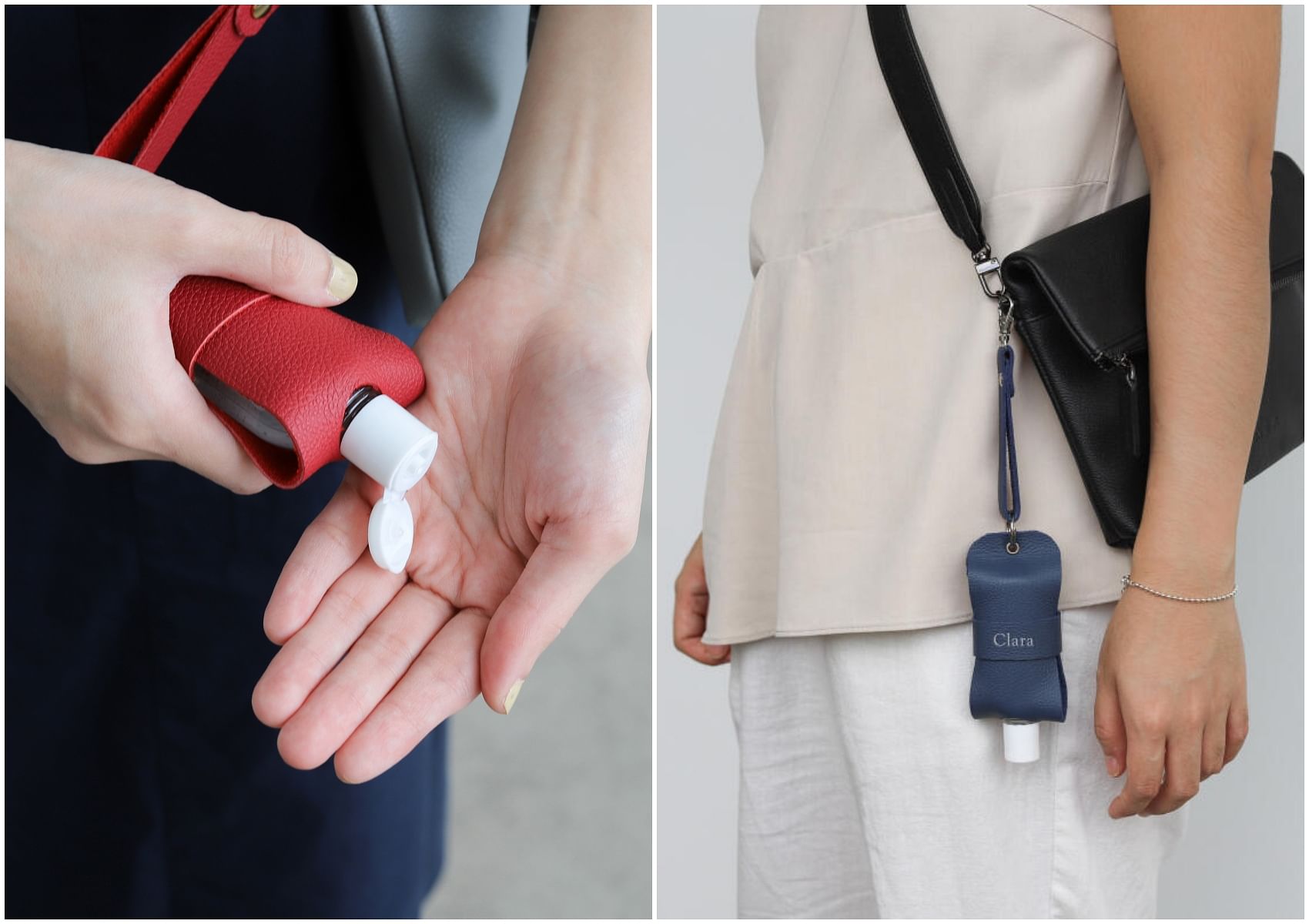
Hand hygiene just got a lot more luxe. Within a week, local leather gifting brand Bynd Artisan went from crafting customised notebooks to European leather hand sanitiser holders.
It was to keep their team of 12 craftsmen, half of whom are aged above 50, active and purposeful, says co-founder Winnie Chan. The bookbinding boss, who is in her late 40s, landed on the idea after buying hand sanitisers in bulk to distribute to her staff.
Their senior craftsman later designed the mould for the hand sanitiser holders.
That was before circuit breaker measures were first announced on April 3, mandating that Bynd Artisan's five ateliers close on April 7.
In three days, they scrambled to pull together take-home kits for their craftsmen. Inside were punching tools, cutting boards, leather pieces, and the holder mould to trace and cut out.
On Wednesday, the team got on a Zoom conference call for a refresh on how to make the leather holders. Among them was their oldest craftsman, a 78-year-old named Mr BC Chong who had undergone open-heart surgery in February and been on medical leave, but requested to join the call.
"When he heard we were doing this, he said 'Please send me a package. I want to do it as well'," says Ms Chan. "He has a purpose - to show solidarity and that active ageing is possible.
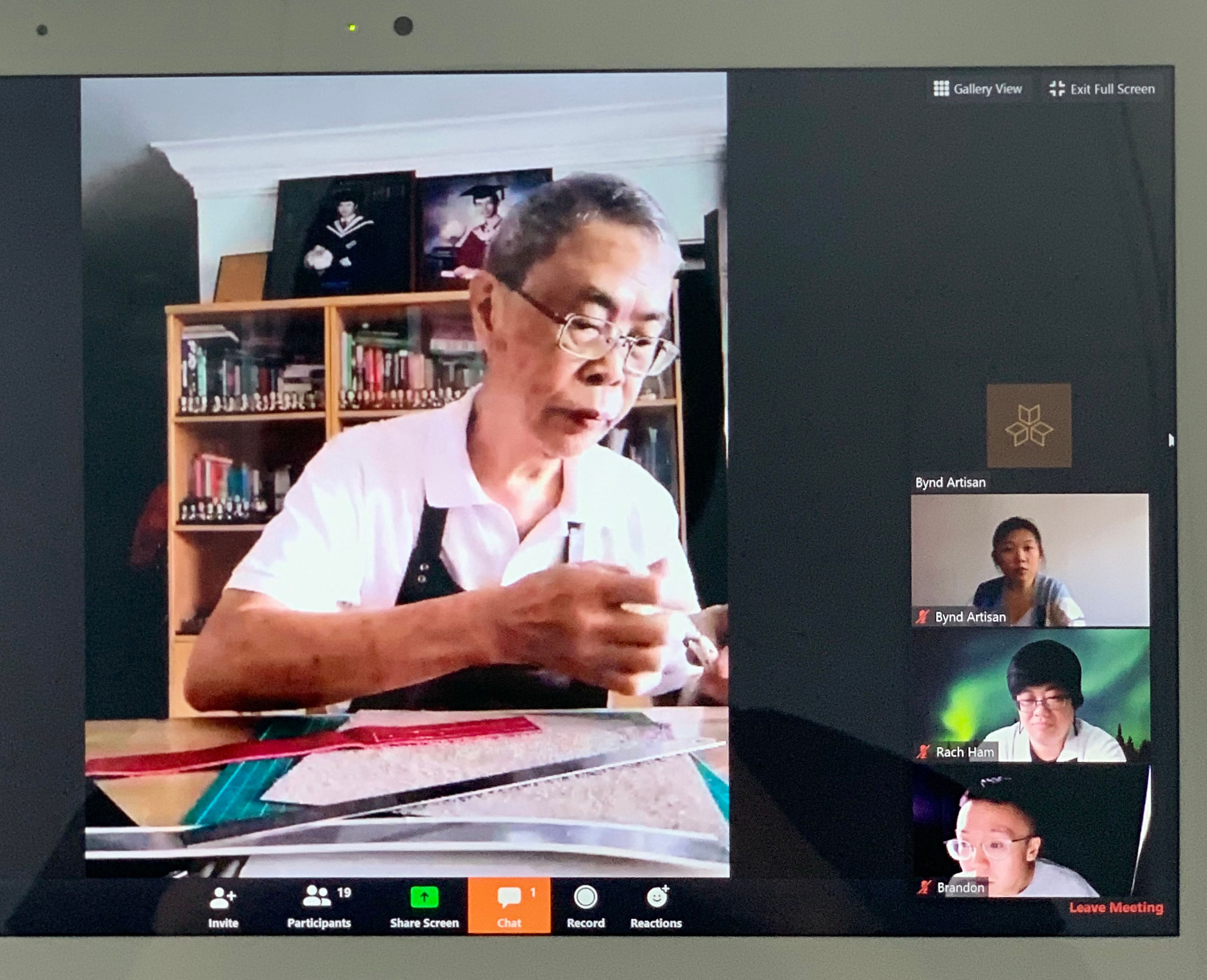
"I think we all want to feel useful - especially during this time when (everyone) worries for the company. So to be able to have that sense of usefulness and being able to contribute, I think, does a lot for their mental well-being."
Crafting from home, most had no problem adapting to making new products, says Ms Chan. In fact, a hand sanitiser holder comes pretty close to airpod holders - which the brand had planned a public workshop for in March. Both have an opening at the bottom - for the hand sanitiser bottle cap to go through, - and the lightning cable charger for the airpod, she adds.
A few hundred orders for the leather holders have already been fulfilled, with positive feedback, says Ms Chan. The pocket-sized presents are priced at $48, and come with a free hand sanitiser, local shipping, and name personalisation (which usually costs $30).
Each one also comes with a message card stating which craftsman made it, for a personal touch. One craftsman was even sent a dimsum treat by the happy customer.
"As business owners, we need to make sure whatever offerings we have are relevant to our audience. There is no point for us to push a passport holder at this time when travel is not possible - it's the wrong time," she says.
Acknowledging the need to think about life beyond the circuit breaker, she teased upcoming designs for a fashion accessory "that can match my outfit and still keep me safe".
"There are a lot of things we're trying to anticipate that our community would need in today's new normal world," she adds. "Bynd Artisan's purpose has always been to make gifting meaningful, and this is our way to let our customers send love and light to people they care about during this time apart."
From batik baju to zero-waste masks
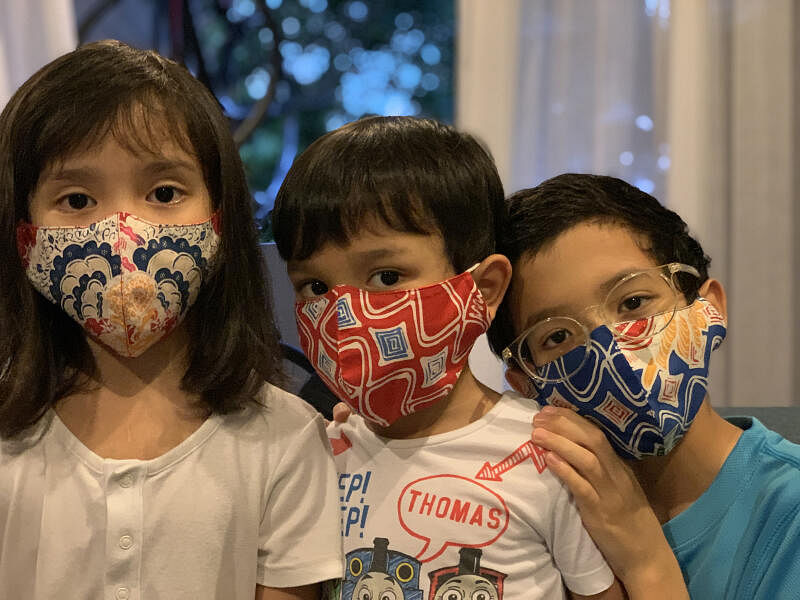
Since early April, fashion entrepreneur Oniatta Effendi has overhauled her clothing line Baju by Oniatta into a mini mask facility, making masks in an array of striking batik prints.
The fabrics used are remnant materials of her former collections - offcuts leftover from where sarong patterns had been cut then kept aside. "I can proudly declare that this set of masks is zero-waste," jokes the owner of boutique Galeri Tokokita.
Sales for her clothing line had been dwindling since Chinese New Year - preparing her for the "big dip", the 46-year-old says. Then about a month ago, before the government started issuing masks, she had dug up an old checker-print mask a friend had bought from Vietnam.
"I got inspired. I thought, you know, we could do this with our remnants."
Doing so keeps a small team of home-based seamstresses in Jakarta afloat. She realised her tailor contact there had stopped receiving business, as clothing production globally was put on hold.
Ms Oniatta sent pictures and measurements of her checkered mask as a sample, and they got to work turning the offcuts into an initial 200 masks - 100 each for adults and children. She put up an order form on her social media channels two weeks ago, and demand poured in.
Back home, she runs it as a one-woman outfit. Her children help out on the weekends, addressing envelopes and sticking stamps. She then bikes to the mailbox to post orders. Around 400 of the colourful cotton masks have already been mailed out to customers here.
The next batch, to be released online early next week, will feature masks made of lurik, a traditional hand-woven cotton.
It is not just the seamstresses who depend on her. For her clothing line, Ms Oniatta works with traditional batik-makers from rural villages in Yogyakarta and Surakarta (or Solo) to craft new fabrics from scratch, colouring and stamping them by hand when commissioned.
They remain short of work for now, as she works her way through her remnant fabrics. But the spunky designer already has plans to commission new pieces once her remnants run out.
Until then, every order placed is a surprise. Customers can fill in a 'colour preference' option, after which she mixes and matches available fabrics to preferences, as best she can.
For some repeat clients whom she knows personally, she makes it a point to find the specific remnant that matches a piece they bought from her previous collections. It makes for the perfect reusable accessory.
"It's just like buying a batik outfit - you would like to keep it forever."
LUXURY FASHION HOUSES PITCHING IN
The trend of pivoting to more essential productions is part of a larger one echoed around the world. Many luxury fashion houses have also put on pause regular production to help fight Covid-19 in their own way. Here are a few notable ones.
Burberry
The British fashion house has swopped its iconic plaid trench coats for non-surgical gowns and masks, produced in the label's trench coat factory in Castleford, Yorkshire.
Bvlgari
In March, as Italy became the epicenter of the pandemic, Bvlgari converted its fragrance production in Lombardy, Italy, to solely manufacture hand sanitising gel. More than 20,000 units have been donated to hospitals and medical facilities across Italy and Switzerland.
From May, the Italian house part of the LVMH Group will donate over 160,000 more bottles to the United Kingdom, in portable 75ml sizes for medical staff to carry on hand.
Chanel
To bolster supplies in France, Chanel began mobilising its partner manufacturers to produce face masks and medical gowns - tapping on some 150 sewing specialists from the house's Haute Couture, Ready-to-Wear and Maisons d'Art workshops.
Christian Dior
Reopening its Redon workshop in Brittany, France - which usually makes Baby Dior clothes - Christian Dior is making masks for French workers in essential services.
Louis Vuitton
The French house repurposed its 12 workshops in France to produce non-surgical masks for healthcare workers and vulnerable communities. Over 300 leather goods artisans were tapped on to do so. At the label's ready-to-wear atelier in Paris, hospital gowns are in production to be distributed to frontline healthcare workers in Parisian hospitals.
Prada
Italian house Prada kept its factory in Montone, Italy open to make 80,000 medical overalls and 110,000 face masks to distribute around the region.
